Related Research Articles
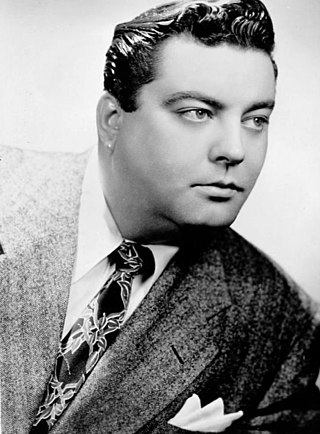
John Herbert Gleason, known as Jackie Gleason, was an American actor, comedian, writer, and composer also known as "The Great One". He developed a style and characters from growing up in Brooklyn, New York, and was known for his brash visual and verbal comedy, exemplified by his city bus driver character Ralph Kramden in the television series The Honeymooners. He also developed The Jackie Gleason Show, which maintained high ratings from the mid-1950s through 1970. The series originated in New York City, but filming moved to Miami Beach, Florida, in 1964 after Gleason took up permanent residence there.
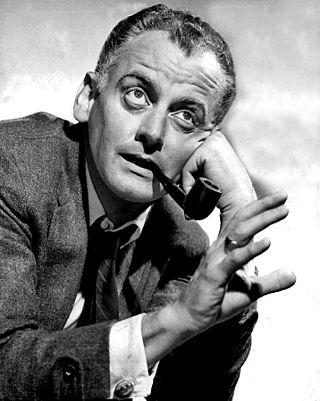
Arthur William Matthew Carney was an American actor and comedian. A recipient of an Academy Award, a Golden Globe Award, and six Primetime Emmy Awards, he was best known for his role as Ed Norton on the sitcom The Honeymooners (1955–1956).

Ralph Wiggum is a recurring character in the animated series The Simpsons. He is voiced by Nancy Cartwright. Ralph is characterized largely by his frequent non-sequiturs which range from nonsensical and bizarre to profound. His dim-witted behavior lends him an air of blissful ignorance.

The Honeymooners is an American television sitcom that originally aired from 1955 to 1956, created by and starring Jackie Gleason, and based on a recurring comedy sketch of the same name that had been part of Gleason's variety show. It follows the lives of New York City bus driver Ralph Kramden (Gleason), his wife Alice, Ralph's best friend Ed Norton and Ed's wife Trixie as they get involved with various schemes in their day-to-day living.

The $64,000 Question was an American game show broadcast in primetime on CBS-TV from 1955 to 1958, which became embroiled in the 1950s quiz show scandals. Contestants answered general knowledge questions, earning money which doubled as the questions became more difficult. The final question had a top prize of $64,000, hence the "$64,000 Question" in the show's title.
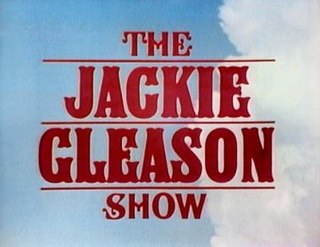
The Jackie Gleason Show is the name of a series of American network television shows that starred Jackie Gleason, which ran from 1952 to 1970, in various forms.
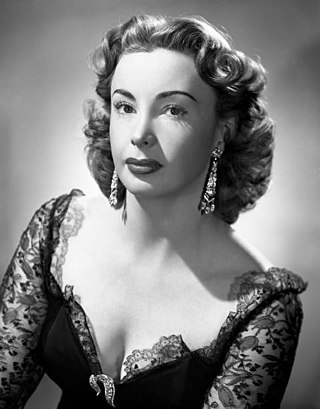
Audrey Meadows was an American actress who portrayed the deadpan housewife Alice Kramden on the 1950s American television comedy The Honeymooners. She was the younger sister of Hollywood leading lady Jayne Meadows.

Bernard Matthew "Barney" Rubble is a fictional character who appears in the television animated series The Flintstones. He is the diminutive, blond-haired caveman husband of Betty Rubble and adoptive father of Bamm-Bamm Rubble. His best friend is his next door neighbor, Fred Flintstone.
The Honeymooners is a 2005 American comedy film directed by John Schultz. An updated version of the original 1950s television series of the same name, this adaptation stars a predominantly-African American cast featuring Cedric the Entertainer, Gabrielle Union, Mike Epps, and Regina Hall. The film was both financially and critically unsuccessful, with Roger Ebert being one of the few to give it a positive review.

Joyce Randolph was an American actress of stage and television, best known for playing Trixie Norton on The Jackie Gleason Show and the television sitcom The Honeymooners.

Pert L. Kelton was an American stage, movie, radio, and television actress. She was the original Alice Kramden in The Honeymooners with Jackie Gleason. During the 1930s, she was a prominent comedic supporting and leading actress in Hollywood films such as Gregory La Cava's Bed of Roses with Constance Bennett and Raoul Walsh's The Bowery with Wallace Beery and George Raft. She performed in a dozen Broadway productions between 1925 and 1968. Most famously, she created the role of 'Mrs. Paroo' in the original production of the musical The Music Man, which she reprised in the movie adaptation. However, her career was interrupted in the 1950s as a result of blacklisting, leading to her departure from The Honeymooners.

You Are There is a 1947–57 American historical educational television and radio series broadcast over the CBS Radio and CBS Television networks.

"Love Is Here to Stay" is a popular song and jazz standard composed by George Gershwin with lyrics by Ira Gershwin for the movie The Goldwyn Follies (1938).
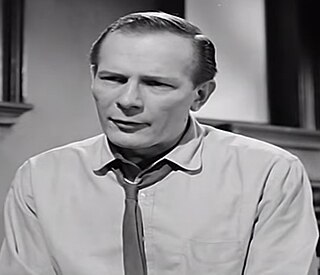
Frank Marth was an American film and television actor. He may be best known as a cast-member of Cavalcade of Stars, especially segments of The Honeymooners, which later became a television series (1955–56).
"The One with the Sonogram at the End" is the second episode of the first season of the NBC television series Friends. It was first broadcast on September 29, 1994. In this episode, Ross processes his ex-wife Carol's pregnancy and supports her as she goes through her first sonogram, though he clashes with Susan over the name of the baby. Rachel struggles to balance her emotions as she meets with her ex-fiancé Barry, and Monica becomes increasingly irate with her parents, eventually spilling the details of Ross's failed relationship that he failed to mention to them.
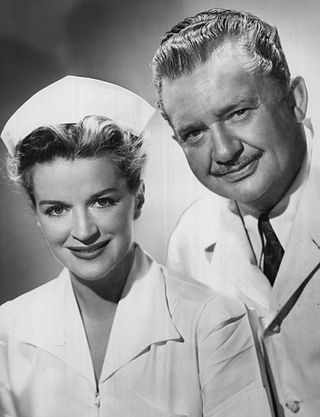
Dr. Christian is a radio medical drama series with Jean Hersholt in the title role. It aired on the Columbia Broadcasting System from November 7, 1937 to January 6, 1954. Two years after the conclusion of the long-running radio program, the series was adapted for television on 1956 where it aired in syndication also through CBS on the Ziv Television production company until 1957, with a younger "Dr. Mark Christian" portrayed by Macdonald Carey as Dr. Paul's nephew.

100 Greatest Episodes of All-Time (1997) and Top 100 Episodes of All Time (2009) are lists of the 100 "best" television show episodes on U.S. television as published by TV Guide. The first list, published on June 28, 1997, was produced in collaboration with Nick at Nite's TV Land. The revised list was published on June 15, 2009. Both lists exclude game shows and variety shows, but include situation comedies and drama series.
"The Long Honeymoon" is the first episode, making it the season premiere, of the sixth season of the American sitcom Modern Family, and the series' 121st episode overall. The episode aired on September 24, 2014. The episode was written by Danny Zuker and directed by Beth McCarthy-Miller.

Situation comedies, or sitcoms, have long been a popular genre of comedy in the US, initially on radio in the 1920s, and then on television beginning in the 1940s. A sitcom is defined as a television series featuring a recurring cast of characters in various successive comedic situations.
References
- ↑ Glenn, Jane K. (2021-11-05). The Joy of Eating: A Guide to Food in Modern Pop Culture. ABC-Clio. p. 152. ISBN 978-1-4408-6210-6.
- ↑ Austerlitz, Saul (2014-03-01). Sitcom: A History in 24 Episodes from I Love Lucy to Community. Chicago Review Press. p. 32. ISBN 978-1-61374-387-4.
- ↑ Halliwell, Martin (2007-03-13). American Culture in the 1950s. Edinburgh University Press. p. 148. ISBN 978-0-7486-2890-2.
- 1 2 "TV's Top 100 Episodes of All Time: #80-61". TV Guide. Archived from the original on March 14, 2010. Retrieved October 29, 2021.
- ↑ Murray, Noel (2010-03-11). "The Honeymooners, "Better Living Through Television"". The A.V. Club . Retrieved 2023-02-15.
- ↑ Dyes-Nugent, Phil (2012-08-10). "How The Honeymooners invented the domestic sitcom". The A.V. Club . Retrieved 2023-02-15.